
|
![]()
Greatest Films of the 1990s
1990 | 1991 | 1992 | 1993 | 1994 | 1995 | 1996 | 1997 | 1998 | 1999
Title Screen Film Genre(s), Title, Year, (Country), Length, Director, Description 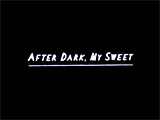


After Dark, My Sweet (1990), 114 minutes, D: James Foley
Co-writer/director James Foley's fatalistic, neo-noirish crime-mystery thriller was a tense and brooding tale (told sparsely by an unreliable narrator in voice-over) about a group of desperate losers in the hot sun and dusty and desolate desert of the Palm Springs area. The themes were deceit, strained loyalties, mistrust, double-crosses, betrayal, and self-sacrificial death. In the plot, a simple-minded, rambling, scruffy-looking drifter and 'fall-guy' patsy agreed to a doomed-to-fail, devious kidnapping attempt. Ex-boxer Kevin "Kid" Collins (Jason Patric) (aka "Collie") had recently escaped from a mental facility. When he stopped in for a drink at Bert's Bar in a small dusty town (Coachella or Mecca) in the desert area of Coachella Valley, he met up with enticingly sexy, hard-drinking, alluring femme-fatale widow Mrs. "Fay" Anderson (Rachel Ward). After Kevin ran into trouble with the bartender, she offered to take him to her neglected plantation-estate and her ranch-style home in nearby Indio, CA, where she hired him to do menial jobs on her property. At a Mexican restaurant, she introduced him to her neighbor Garrett Stoker (aka Uncle Bud, but unrelated) (Bruce Dern). The smooth-talking Uncle Bud suggested: "I might be able to put you next to somethin' pretty good." Although Kevin left briefly after being warned by Fay about Uncle Bud's schemes, he returned to her, and was immediately roped into one of Uncle Bud's quick-money schemes - Bud's confident, well-thought-out plan was for Kevin to impersonate a rich child's uniformed chauffeur (Mr. Rogers) and kidnap a young schoolboy Charlie Vanderventer (James Cotton), and then demand a ransom from his rich parents. As Kevin (in a chauffeur's uniform) drove in Fay's car to the golf course - the kidnapping location, he was fatefully resigned to proceed with the fool-hardy scheme. The kidnapping proceeded with some complications, including the fact that the boy was sick with diabetes, and Kevin had deep-rooted suspicions that both Fay and Uncle Bud had set him up to be killed. Nevertheless, Kevin proposed to Fay that they could now escape and be together if they wanted to, but then he became thoroughly confused by Fay's mixed signals, accusations, and feelings for him. Kevin administered a life-saving injection of insulin to the ailing boy, and then had vigorous rounds of sex with Fay, but he was still suspicious of her intentions and didn't trust her. The film concluded with a tense scene at the Palm Springs Airport - the location of the ransom drop-off and pick-up point, where Uncle Bud retrieved the ransom but was shot and killed. Kevin, Fay and the boy were able to safely retreat to a desert area, where Kevin had a moment of clarity. He re-judged Fay as an honest, weak and innocent female who had been carried away and "abducted" by the evil and bad influences of both Uncle Bud and himself. If he hadn't randomly come into her life, their deadly scheme would never have happened. He decided that the only way to find meaning and purpose in his life, and to make sense out of everything, was to heroically sacrifice himself for her (to keep her free of blame) and to keep the kidnapped boy alive. His plan was to make it look like Fay was also his victim, so that he could completely remove her from any and all implied consequences. Fay was goaded into defending herself against him - and making herself look like an innocent victim; she grabbed his gun and shot him point-blank. He fell down by the side of the dirt road, and calmly and poignantly drifted off into death.
Avalon (1990), 128 minutes, D: Barry Levinson
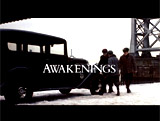

Awakenings (1990), 121 minutes, D: Penny Marshall
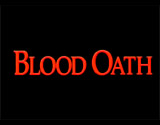



Blood Oath (1990, Australia/UK) (aka Prisoners of the Sun), 108 minutes, D: Stephen Wallace
During World War II, Ambon Island in Indonesia (known as the Dutch East Indies), a small island just north of Australia, was the location of the Japanese Tan Tai POW camp holding about 1,100 Australian prisoners (known as 'prisoners of the sun'). By 1945, the numbers had dropped to about 300, due to cruel and abusive treatment by Japanese captors. Then, a mass grave was discovered with the bodies of many missing Australian POWs, who were massacred (bayoneted and beheaded). An Australian War Crimes Tribunal was scheduled, to try 91 Japanese officers and soldiers, including sly Vice Admiral Baron Takahashi (George Takei), the main commanding officer (Oxford-educated), and the savage head of the prison camp Captain Ikeuchi (Tetsu Watanabe). The determined Australian military prosecutor was Captain Robert Cooper (Bryan Brown), assisted by Lt. Corbett (Russell Crowe in his film debut). The defense counsel was Shinji Matsugae (Sokyu Fujita). It was a difficult case, because there were no surviving POWs who could testify (not even a 4-man crew on an unarmed reconnaissance plane that was shot down), the camp records had disappeared, and the defendants uniformly denied the charges. Takahashi was returned to the island in the custody of an American officer and military observer Maj. Beckett (Terry O'Quinn), who didn't want to convict Takahashi, who had already been promised a post-war job in Tokyo. In the first of three separate trials, Takahashi declared ignorance of the atrocities, and blamed the camp's treatment of POWs on Ikeuchi. He was acquitted and flown back to Japan. Then, Ikeuchi testified that he had no recollection of the mass killings ("I know nothing of any executions!"). Then, a break came when the grave site of the four beheaded airmen was discovered. Eyewitness evidence of Ikeuchi's involvement came when Private Jimmy Fenton (John Polson), an ailing POW about to die, testified about the brutal tortures and executions. Communications officer Lt. Tanaka (Toshi Shioya) took the stand. As a witness against Ikeuchi, he also testified that he had been ordered by Takahashi to kill one of the airman - he had been misled about an alleged court-martial of the prisoner. Another officer Lt. Shimada (Yuichiro Senga) claimed that both Takahashi and Ikeuchi participated in (or knew about) the mass executions. Tanaka was declared guilty and sentenced to death (by firing squad) by the tribunal. Ikeuchi suicidally and ritualistically committed hari-kari before his execution, while Takahashi escaped punishment.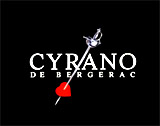




Cyrano de Bergerac (1990, Fr.), 137 minutes, D: Jean-Paul Rappeneau


Dances With Wolves (1990), 181 minutes, D: Kevin Costner
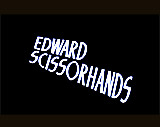



Edward Scissorhands (1990), 100 minutes, D: Tim Burton
Tim Burton's original modern-day fairy tale (and part tearjerker and dark suburban comedy) opened with an old lady telling a bedtime story to her grand-daughter about where snow came from. Mild-mannered Edward Scissorhands (Johnny Depp) was the unfinished artificial creation of a deceased mad inventor (Vincent Price), outfitted with razor sharp shears for hands. A critique of garish 50's suburban life was made when fish-out-of-water Edward was adopted to live in the pastel-colored home of Peg (Dianne Wiest), an Avon representative. His artistic abilities included sculpting ice angels, tossing salads, giving haircuts, and clipping poodles and hedges. In this Beauty and the Beast allegory, his love for pretty blonde teenager Kim (Winona Ryder) wasn't reciprocated until she realized his unique beauty. And in the somber climax, she saved him from a hostile Frankenstein-like mob, to return and live as an outcast in the Munsters-like mansion on the hill - and to create the town's snow.



Ghost (1990), 122 minutes, D: Jerry Zucker
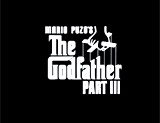


The Godfather, Part III (1990), 161 minutes, D: Francis Ford Coppola
See Godfather series.


GoodFellas (1990), 146 minutes, D: Martin Scorsese
Based on Nicholas Pileggi's non-fiction book Wiseguys - a definitive and stylish, violent gangster film, with a soundtrack that chronicles the passage of time through three decades of crime (the 50s to the 70s) in the life of a mid-level, aspiring mobster Henry Hill (Ray Liotta). Raised on the streets of a Brooklyn neighborhood, he marries Karen (Lorraine Bracco) and slowly advances up and climbs the Mafioso ladder. With superb performances by Joe Pesci as meanly psychotic wiseguy Tommy DeVito, and Robert DeNiro as paranoid James Conway. In the end as his life unravels, after dealing narcotics and becoming hooked, Hill protects himself and his wife by testifying and becoming part of the federal witness protection program - and being left in anonymous, suburbanized exile.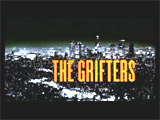


The Grifters (1990), 114 minutes, D: Stephen Frears
British filmmaker Stephen Frears' seedy and tense film of gamesmanship, treachery and double-crosses featured three deceptive characters and amoral themes. Set mostly in Los Angeles (and partially in La Jolla) in the present day (and filmed with bright colors by cinematographer Oliver Stapleton), the intense and bleak drama told about a threesome of con artists and accomplished shysters-tricksters whose lives were inextricably intertwined, especially the two females who were engaged in a deadly power-struggle love-triangle for the male's allegiance. The first hard-as-nails grifter was introduced at the Paloma Downs Racetrack in New Mexico: 39 year-old, experienced horse-gambler and professional grifter Lilly Dillon (Anjelica Huston). The swanky, platinum blonde, cheaply-elegant, race-track hustler's main occupation was to place large bets on long-shot horses at the last minute to manipulate the odds and create profits for her bookie-boss Bobo Justus (Pat Hingle) back in Baltimore, MD. The second grifter was 25 year-old, small-time, two-bit, nickel-and-dime crook-hustler and con-artist Roy Dillon (John Cusack); the son of Lilly, he was only a "short con" artist with low-risk grifts (such as the familiar, folded $20 dollar bar-scam). The third high-stakes swindler-grifter was a charming and vixenish feline - 35 year-old sexy and deceitful Myra Langtry (Annette Bening). She was capable of easily resorting to tricking herself out if necessary, while also serving as Roy's girlfriend for the last two months. After her job in NM, Lilly proceeded to the track at La Jolla, CA ("to handle playback there"), but first detoured to Los Angeles on the way to visit her estranged son Roy, after an 8-year lapse; in his apartment, she greeted him with a kiss on the lips. Lilly noticed Roy's sickly condition, due to an injury to his stomach days earlier; she immediately phoned for a doctor associated with her boss, and arranged for an ambulance. Roy's mother and his "friend" Myra met each other for the first time at Roy's hospital bedside, where he was being treated for internal hemorrhaging after being caught swindling a bartender and being punched in the upper torso with a baseball bat. Roy awoke and weakly told the two rival females to stop fighting over him. Roy refused to have his over-controlling and jealous mother dictate who he partnered with, even if she considered Myra a "dog." Shortly later, Lilly's angry bookie boss Bobo Justus confronted Lilly about swindling from him and being disloyal (by skimming cash), and he punished her by burning the top of her right hand with his cigar. During a weekend trip to the San Diego area (La Jolla) with Myra, Roy was presented with her suggestion that they become partners-in crime: ("Right now, it's the perfect time"), but he was reluctant to join her in any "long-con" schemes. Roy took the opportunity to visit Lilly in La Jolla, where he rejected her idea of giving up grifting and getting a "straight job": ("It's up to me. I'm strictly short-con...small-time stuff"). Lilly was highly dubious and resentful of Roy's grifting, and spurned her son's desire to follow in her footsteps and waste his life. Later, Roy knew that Myra was distrusting of him when she made the accusation that his controlling mother had influenced him to break it off with her. Roy asserted to Myra that he had always been independent of his mother's decisions and wishes since he was 17 years old. As Roy continued to reject Myra's propositions to partner up, his negative reactions caused Myra to retaliate and imply that he had an unnatural (incestuous love?) relationship with his mother. He became infuriated, struck Myra twice across the face and ordered her to leave his apartment. Myra vengefully called Lilly's boss Bobo, and tipped him off to the large amount of stolen cash stashed in Lilly's car's trunk compartment. Worried about retaliation from Bobo, Lilly skipped town and fled to the Phoenix, AZ area, not knowing that Myra was in pursuit. Late in the night, Myra stole the clerk's key ring - and stealthily entered Lilly's room to strangle her as she slept in bed - the outcome of the murder attempt was left uncertain. As next of kin, Roy was summoned to Phoenix to help identify the face-blasted female (resembling his mother) who had been shot in the face in her motel room - apparently from a self-inflicted gun shot. In the morgue, he realized that the corpse belonged to Myra, not his mother, since the body's right hand was missing the cigar-burn wound. Lilly had faked her own death and remained alive (to go on the run), while Myra was the victim - Lilly had murdered Myra in self-defense. In the film's denouement, Lilly (wearing Myra's red dress and driving Myra's car) arrived back in Los Angeles to confront her son. She was desperate and appeared to be stealing his money hidden behind two paintings. She suggested that this might be her best chance to make a break and get out of the con games and grifting, but Roy refused to have her take all his money. After a strange, awkward and seductive kiss between them, as he turned away to drink water from his glass, in the film's most bizarre twist, she swung the attache case full of cash at her son's head; his drinking glass smashed and cut an artery in his neck - and he profusely bled to death on the floor in front of her! Following Roy's accidental murder, Lilly gathered up some of the cash on the floor, briefly washed the blood off herself in the kitchen, ran out the door with the case, descended in the caged elevator to the parking garage below, and then calmly drove away in Roy's car down Wilshire Blvd.
Home Alone (1990), 98 minutes, D: Chris Columbus



The Hot Spot (1990), 130 minutes, D: Dennis Hopper
Director Dennis Hopper's contemporary erotic thriller and neo-noir featured themes of adultery, jealousy, robbery, blackmail, betrayal, and murder, with many double-crossing twists and turns. Everything played out within a double love-triangle amongst a trio of shady and scheming characters in a steamy and hot-house atmosphere. In the film's opening, handsome 36 year-old scheming drifter, slick loner and restless womanizer Harry Madox (Don Johnson) drove into the sun-baked town of Landers, TX, where he visited the town's "hot spot" for a beer - "The Yellow Rose" bar. At the nearby Harshaw Motors car lot on the main street, the slick and cocky stranger demonstrated how he could close a deal and sell a vehicle, and was instantly hired by owner George Harshaw (Jerry Hardin). His co-worker was tobacco-chewing salesman Lon Gulick (Charles Martin Smith). He had initially turned down the offer, but after one glance at the office's secretary-bookkeeper: sweet, wholesome and soft-spoken 19 year-old brunette Gloria Harper (Jennifer Connelly), Harry was persuaded to accept and remain in town. In the film's backstory that was slowly revealed, the troubled Gloria was being harrassed and blackmailed by the town's sleazy degenerate and "deadbeat" Frank Sutton (William Sadler). In town, Harry happened to notice that during a fire, the bank across the street was completely unattended and vulnerable to a robbery - and he ambitiously dreamed about his next big score. At the car dealership, Harry was introduced to his new boss' wife - the sultry Dolly Harshaw (Virginia Madsen). Clearly, she was a hot-blooded, bored, trampy, predatory and opportunistic, sinful blonde wife, who was interested in engaging in a lengthy sexual affair with Harry. A love triangle formed due to his concurrent serious feelings for the young and innocent Gloria. Harry was also able to perfectly execute his plan to rob the bank by creating a distraction in town, although he became the crime's prime suspect. Due to Harry's on-going affair with Dolly, she rescued him from jail by conveniently providing him with an alibi (perjured) for his exact whereabouts at the time of the fire and the bank heist. Dolly became jealous of Harry's growing interest in Gloria, and was able to apply pressure on Harry - with threats of blackmail and the recanting of her testimony - to pressure him into seeing her and becoming further involved in their affair. She also hinted that her husband had a weak-heart and required an operation, and that he could possibly die - if she had her way: ("Anything at all too excitin' will just kill him"). Meanwhile, during a picnic and swim with Gloria, Harry learned how Sutton had threatened the blackmailing revelation of her sister Irene Davey's (Debra Cole) lesbian affair with a former teacher -- causing Gloria's sister to commit suicide. Sutton threatened to spread rumors of other sexual improprieties when they were young girls if he wasn't paid to keep quiet (through blackmail and extortion). Gloria had been embezzling money from her workplace ($500 each time) to pay Frank off, to prevent him from publicizing the nude photos of her with Irene. At the same time, Dolly confronted Harry about how serious he was becoming with Gloria, and when Harry refused to give her up, she became very spiteful and jealously enraged. Dolly deliberately caused her husband George's death with a heart-attack from sexual over-excitement. Meanwhile, Sutton was also pressuring Harry with blackmail demands, threatening that he would report that he witnessed Harry's whereabouts during the fire and bank robbery (even though he wasn't there). At the same time, Harry stressed to embezzler Gloria that she must end her blackmail payments to Sutton. To avoid suspicion and further efforts by Sutton to continue blackmailing both him AND Gloria, Harry paid a visit to Sutton's shack, where he caught an unidentified female having sex with Sutton (it was at first thought to be Gloria, but later revealed to be Dolly, involved in another love triangle) before she fled. During their physical struggle, Harry shot and killed Sutton, and then made the crime scene look like it was a self-inflicted suicide, and he also implicated Sutton as the bank robber. However, in the film's conclusion, Dolly now had the upper-hand - she had acquired her husband's car business, and threatened to reveal incriminating information about Harry if he didn't obey her demands: ((1) Harry set fire to the building and robbed the bank, (2) Gloria embezzled dealership money to pay off blackmailer Sutton, and (3) Harry staged the suicidal-murder of Sutton); Dolly also implied that Harry had betrayed Gloria by engaging in their own secret affair. Her devastating accusation caused Gloria to break it off with Harry and cancel their Caribbean marital plans. Once Gloria walked off, Harry acknowledged to Dolly that Sutton had absolutely nothing on him: ("Sutton didn't know. He wasn't even at the fire"); Harry denounced Dolly for working with Sutton all along: "You told him. It was you!" Although he was tempted to strangle Dolly, Harry relented and realized he had been trapped and ensnared by her, and he was forced to kiss her and accept his fate with her.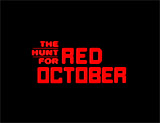



The Hunt for Red October (1990), 134 minutes, D: John McTiernan
See series of Jack Ryan films.


Jacob's Ladder (1990), 115 minutes, D: Adrian Lyne
Director Adrian Lyne's psycho-horror thriller opened with scenes of haunted Vietnam vet Jacob Singer's (Tim Robbins) many blurry, drug-related visions after being seriously wounded in combat. Believing he survived, he experienced hallucinatory, disturbing visions of demons, horns and a faceless Evil Doctor. He required therapeutic counseling and reassurance from guardian angel chiropractor Louis (Danny Aiello). In the film's plot twist conclusion, he calmly ascended a staircase into golden light to reunite with his dead 6 year-old son Gabriel (uncredited Macauley Caulkin) after peacefully accepting his own death and freeing his soul.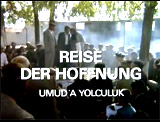

Journey of Hope (1990, Switz./Turkey/UK) (aka Reise der Hoffnung, or Umuda yolculuk), 110 minutes, D: Xavier Koller

Ju Dou (1990, China/Jp.), 95 minutes, D: Yimou Zhang



King of New York (1990, US/It.), 103 minutes, D: Abel Ferrara
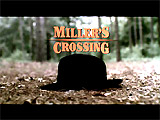

Miller's Crossing (1990), 115 minutes, D: Joel Coen


Misery (1990), 107 minutes, D: Rob Reiner
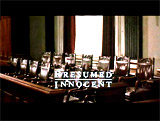




Presumed Innocent (1990) 127 minutes, D: Alan J. Pakula
This crime mystery thriller began with the news of the brutal rape and murder of Carolyn Polhemus (Greta Scacchi) in her apartment - she was the pretty colleague-assistant of chief deputy DA Rusty Sabich (Harrison Ford). Sabich was chosen to lead the investigation - an awkward position since Polhemus had recently been his ex-lover, but had dumped him for Sabich's boss, prosecuting DA Raymond Horgan (Brian Dennehy). Sabich had since reconciled with his wife Barbara (Bonnie Bedalia) who knew about the affair and his mistress. And then Sabich was charged with the murder. There was overwhelming evidence, discovered by detectives, that Sabich had committed the crime. The case was prosecuted by recently-elected, inept County Prosecuting Attorney Nicco della Guardia (Tom Mardirosian) and a new deputy named Tommy Molto (Joe Grifasi), the head of homicide. Top defense attorney Alejandro "Sandy" Stern (Raul Julia) agreed to defend Sabich, while the presiding judge was Judge Larren Lyttle (Paul Winfield). The prosecution noted Sabich's fingerprints at the crime scene on a beer glass (that went missing), numerous phone calls between Sabich and Polhemus, Sabich's semen inside the victim, and a matching blood type. Sabich's home revealed Polhemus' blood-stained clothing, and rug fibers. False testimony by Horgan about how Rusty had insisted on handling the investigation hurt the prosecution, with the defense claiming a frame-up and cover-up (in an unrelated bribery scandal involving many of the trial's participants). During the testimony, pathologist/coroner Dr. "Painless" Kumagai (Sab Shimono) reported that the semen sample was strangely mixed with a spermicidal contraceptive, but Polhemus was not using a diaphragm (in fact, she had a tubal ligation). Therefore, the semen must have come from someone else's body, not from Polhemus. These findings caused the case against Sabich to be dismissed by Judge Lyttle. Afterwards, there were numerous plot surprises and twists, including: (1) the unexpected discovery of the beer glass, (2) Sabich's discovery of one of his claw hammers (the murder weapon) covered in dried blood and blonde hair in his toolbox, (3) Barbara's delivery of a shocking revelation to her husband - she confessed that she had killed his assistant, due to jealousy regarding their clandestine affair, and then framed him. Barbara admitted her guilt to her husband when he asked her about it, with a lengthy rationale: "A woman's depressed with herself, with life, with her husband who made life possible for her 'til he was bewitched by another woman. A destroyer. Abandoned, like someone left for dead, she plans her suicide. Until the dream begins. In the dream, the destroyer is destroyed. That's a dream worth living for..." (4) Barbara had committed the murder to make it look like a rape by a "sex-crazed man." She had planted the beer glass with his fingerprints in the apartment, and injected her husband's semen into Polhemus' vagina. Rusty's voice-over ended the film: "The murder of Carolyn Polhemus remains unsolved. It is a practical impossibility to try two people for the same crime. Even if it wasn't, I couldn't take his mother from my son. I am a prosecutor. I have spent my life in the assignment of blame. With all deliberation and intent, I reached for Carolyn. I cannot pretend it was an accident. I reached for Carolyn, and set off that insane mix of rage and lunacy that led one human being to kill another. There was a crime. There was a victim. And there is punishment."


Pretty Woman (1990), 119 minutes, D: Garry Marshall
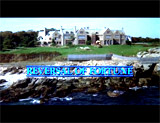

Reversal of Fortune (1990, US/Jp./UK), 120 minutes, D: Barbet Schroeder
"The Case of Claus Von Bulow. An American Saga of Money and Mystery" was the perfect tagline for this biographical mystery-drama about a murder case involving a rich couple in the late 70s and early 1980s, who lived in Newport, Rhode Island. The film was narrated by the deceased, disembodied female protagonist in her hospital bed, and based upon a 1985 book written by the defense attorney. Claus Von Bulow (Jeremy Irons) lived in luxury with wealthy American heiress Martha "Sunny" Von Bulow (Glenn Close), who had become abusively addicted to drugs and alcohol. Because of their icy cold, loveless relationship and near-divorced status, Von Bulow had taken a mistress, Alexandra Isles (Julie Hagerty). At Christmastime in 1979 and also about a year later, the self-destructive, hypoglycemic Sunny was found comatose in her bathroom (with an overdose of insulin). In the second instance, she did not regain consciousness, and under the suspicious circumstances (noted by Maria (Uta Hagen), Sunny's personal maid), Claus was investigated. Sunny's two eldest children (from her first marriage), Alexander von Auersberg (Jad Mager) and Ala von Auersberg (Sarah Fearon), hired an attorney to privately look into the matter. After finding questionable medications (insulin with a syringe) in a black bag in his closet, Von Bulow was charged with two counts of assault to commit murder (injecting her with an overdose of insulin). He was convicted and sentenced to 30 years in prison in 1982. The case was appealed, when brilliant, driven Harvard law professor Alan Dershowitz (Alan Silver), a liberal Jew, and a contingent of law students (recruited from his classes) agreed to try to convince the Rhode Island Supreme Court to "reverse the fortune" of the imperious, unsympathetic European Von Bulow who had an attempted murder conviction. The defendant was out on $1 million dollars bail provided by his ex-employer, billionaire J. Paul Getty. The public and most people thought it was obvious that the haughty, aristocratic Von Bulow was guilty, because he stood to gain $14 million from his wife's death. Dershowitz uncovered irregularities, weak physical evidence from sloppy investigative work, faulty logic, and unreliable witnesses (especially star witness maid Maria). And Sunny herself was considered psychologically and physically unstable and may have attempted suicide. The conviction was reversed, and after a new trial, Von Bulow was acquitted. But the tantalizing film (with some black humor from Von Bulow himself) remained very ambiguous regarding his guilt or innocence. Victim Sunny remained in a coma for almost three decades.



Total Recall (1990), 113 minutes, D: Paul Verhoeven
Dutch director Paul Verhoeven's adrenalized, escapist, mind-bending version of Phillip K. Dick's VR allegory starred Arnold as Douglas Quaid, a futuristic construction worker dissatisfied with his ordinary life, and experiencing recurring dreams of living on Mars with a pretty brunette. He hired the Rekall travel agency to take a fantasy 'virtual' vacation (with memory implants) to the red planet. He was then faced with an existential identity crisis when he discovered forgotten memories - Was his alter-ego a double agent on Mars named Hauser or not? Was his whole life "just a dream"? The hyperactive action (on both Earth and the red planet of Mars) was non-stop and excessively-violent with a high body count, as Hauser/Quaid searched for the reason why he was being hunted. After learning that his beautiful but treacherous blonde wife Lori (Sharon Stone) was aligned with the enemy (led by the villainous Mars colony governor Vilos Cohaagen (Ronny Cox)), he delivered a crowd-pleasing "Consider that a divorce" as he mercilessly shot her in the head. The spectacular special F/X included a giant alien artifact machine, a deformed terrorist Resistance revolutionary named Kuato, and a 3-breasted mutant bar prostitute.





Wild at Heart (1990), 126 minutes, D: David Lynch